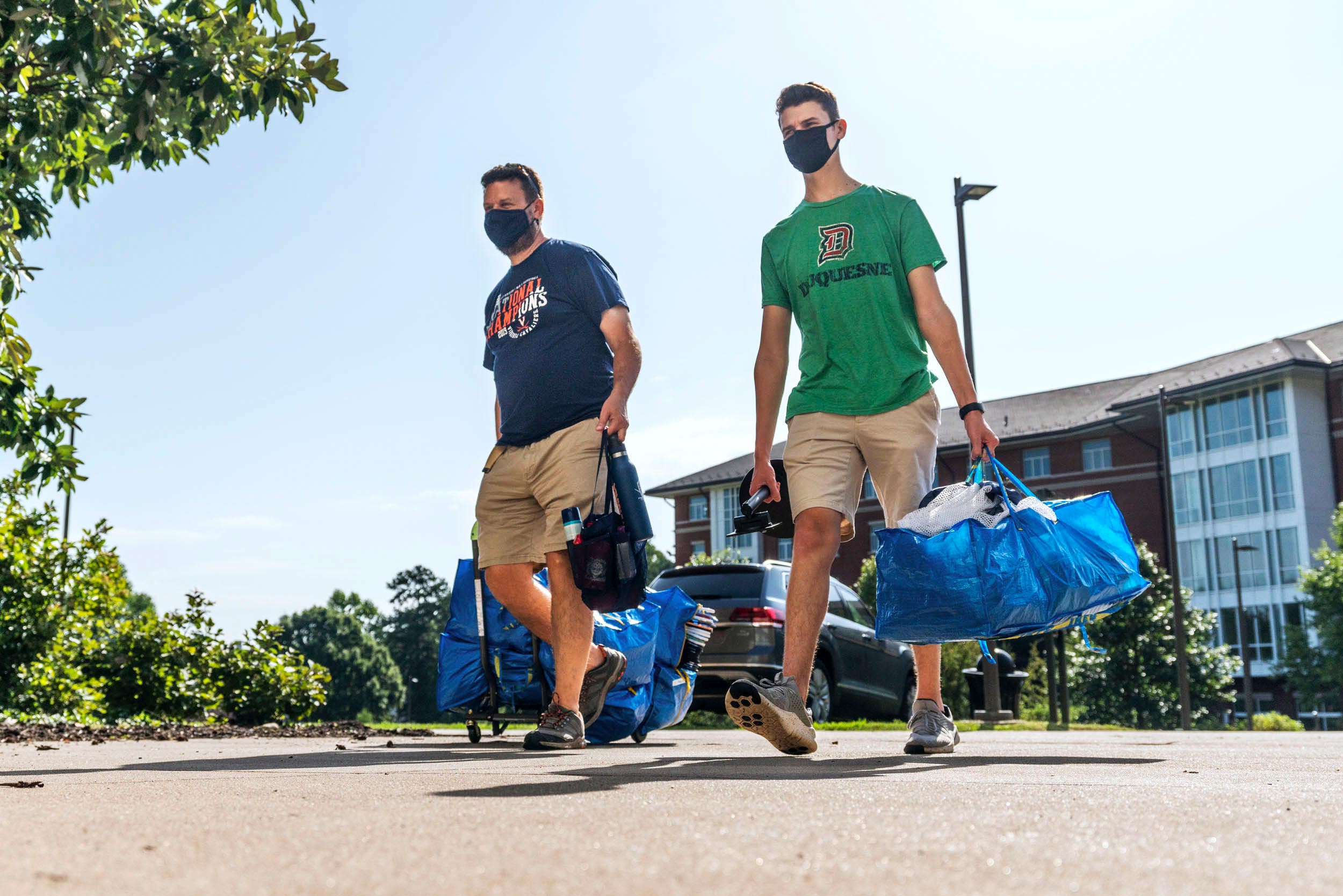Parents and families of new college-aged students are in major prep mode right now, buying items to outfit dorms and finalizing plans to drop their children off at school.
It’s a natural state of being for parents, who have been in the child care zone for 18 years. From finding the perfect preschool to enrolling their children in soccer leagues and enrichment programs and guiding the college application process, it’s all-hands-on-deck for this new phase of parenthood.
It’s a huge transition for students as well as parents. Tim Davis, a clinical psychologist and an assistant professor of public policy in the University of Virginia’s Frank Batten School of Leadership and Public Policy, is here to help.
Davis is an expert in resiliency and teaches a course called “The Resilient Student: Transition, Thriving and Leadership.” (Parents, there are still plenty of spaces for your student to register.)
He is also helping steward an executive education and lifelong learning program called “BattenX,” and will be leading a session called “Coaching for Excellence: Bringing Out the Best in Others” in Arlington in November.

Clinical psychologist and assistant professor of public policy Tim Davis has been speaking to parents at UVA orientation sessions since 2017. (Photo by Dan Addison, University Communications)
Davis has been speaking to parents at UVA orientation sessions since 2017, offering his expert advice on ways guardians can successfully pivot to the new, college phase their families are facing.
Because orientation sessions are online this summer, UVA Today asked Davis if he could share some of his expertise here. Read on for six of his best tips, in his own words and in no particular order.
Give Your Child Permission to Struggle
The upside and the challenge with UVA families is they tend to be very high-achieving groups of people. Sometimes their students come in and if they feel like they struggle at all, then they feel like they don’t belong at UVA because they’ve seen so much success modeled in their life. It’s really important to say to your student that it’s OK to come up short, to get a bad grade here and there, to not get elected to the office that you wanted.
We know, based on science, that students have to have a prerequisite amount of adversity during their four years in college in order to develop optimal mental health. Without those struggles, without adversity, they will not be able to develop into the high-functioning, resilient young adults that we want them to become. Giving them permission, even supporting them in struggling a bit, normalizing that in the conversation and reminding them that it’s actually critical that they encounter adversity and struggle with it, is important.
That’s when they’re developing new skills, new competencies, new neural networks that will, in my opinion as a clinical psychologist, be the most important thing that they walk down the Lawn with, when they have that cap on: a newly wired brain.
Manage Your Frequency of Contact
Daily contact with your student is too often, and texting counts.
From a developmental standpoint, at this time in students’ lives, their primary job is to individuate and separate from their family. And parents, while very well-intentioned, often kind of short-circuit their child’s ability to do that job by having too much contact.

Parents need to know that the best thing for their students – even though they may not know it – is to be given the space to find their own pockets of support and advice and to be allowed to think through some of their own solutions to problems and to build their own nest, emotionally and socially, outside the context of the family.
Don’t Do Anything for Your Students They Can Do for Themselves
Again, if you look at what they’re supposed to be doing developmentally at this time in their lives, it is time for parents to stop taking care of their problems and start being good listeners. Offer advice only when they’re out of their own ideas or if they’re in a true crisis – and not mini-crises. Students need to manage those on their own. Just pay attention to not doing anything for them that they can do for themselves.
Have Them Put Some Skin in the Game
One of the ways that we raise responsible and accountable young adults is by not giving them everything.
Even if you’re fortunate enough to come from a background where you don’t have a lot of financial concerns and you can afford to cover everything for your kid, I think it’s really important to get them to put some skin in the game by having them, for example, pay for at least a portion of their expenses, be it their rent or their books or whatever. The monetary amount really isn’t all that important. It’s the idea that they will learn to value what you give them more if they are asked to be responsible for paying for any part of it.
I’ll give you an example. We put our 12-year-old on our phone plan and asked her to contribute $10 a month. It’s not that $10 a month makes or breaks our budget. It’s just really important that she understands that things cost money and that she will appreciate being as privileged as she is if she had some skin in the game.
Praise Their Behaviors, Not Their Traits
We’ve learned a lot about the self-esteem movement. It was a complete flop in the 1970s and ’80s, when we thought telling young people how great they were or how smart they were, or how talented they were, improved their self-esteem.
What we actually found was that it had a deteriorative effect on self-esteem. When we praise them for being smart or talented or athletic or whatever these floridly grand terms are, it actually stopped them in their tracks. And that’s because that approach creates the belief system in which they think they’re either born with that wonderfulness, or they’re not born with it. And what they’re born with is not under their control. What their genetic makeup is, is not under their control.
What is under their control is how they behave; what strategies they use; how hard they work, how much they’re willing to push themselves out of their comfort zone; how many hours they put in preparing for an exam.
We know now that when we when we give our students feedback on how they’re behaving – rather than what their traits are – that improves their self-esteem, and it makes them more effective. We can even measure it in tests of cognitive ability. For example, one intervention, of telling a student how hard they worked on an exam, predicts higher performance on the next exam than telling them how smart they are. So, be careful to praise behaviors and not traits.
Encourage Their Lives Outside of the Classroom
I think this one is really important. This is also the one I end the parent talk with at orientation.
Encourage your student’s life outside the classroom. I advise parents that they are not sending their student to UVA to learn any particular kind of content. You are sending them here to learn how to become high-functioning, emotionally and socially well-adjusted, successful adults.
Of course, they come out with new expertise learned inside the classroom. But, what really makes the difference is in what happens for them outside the classroom. That’s when they really develop the competencies to be super successful, competent adults. Because we know 70% of undergraduates do not work in the field related to their college major. So, while they will leave here with some really important book knowledge and some professional competencies – and we want that and that’s important – encouraging their life outside the classroom is also supported by the science of young adult development, because we know that students who have measurably stronger social support networks and have more of an experience of social belonging in college, those things predict good grade-point averages, and they predict happiness.
So, if you really want your kids to be academically successful in the classroom, that in many ways starts outside the classroom. It starts with them being engaged in activities and organizations and communities that give them a sense of social support and belonging here. And that is foundational, and they then develop success in their careers.
Media Contact
Article Information
August 11, 2021
/content/uva-clinical-psychologist-offers-6-tips-parents-new-college-students

